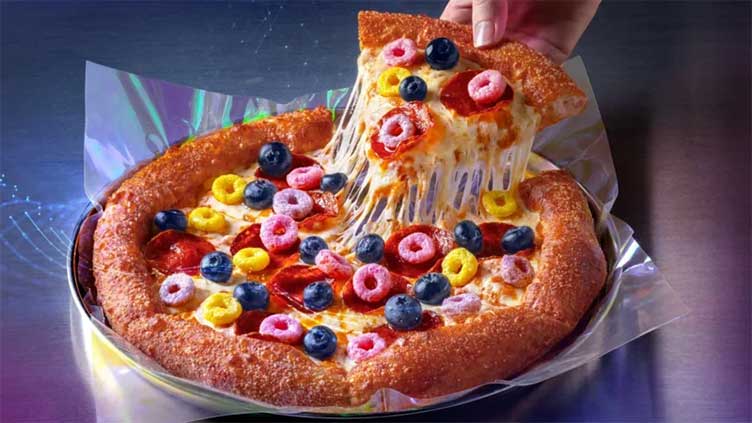Are AI-created recipes hard to swallow?

Technology
Not everyone in the food trade loves the idea of AI
(Web Desk) - "We asked (popular AI chatbot) ChatGPT to create a recipe - the best pizza for Dubai," says Spartak Arutyunyan, who heads menu development for the city’s branch of restaurant and delivery chain Dodo Pizza.
"And it did create a recipe. We launched it, it was actually a huge hit, and it's still on the menu.”
With 90% of Dubai's three million people being immigrants, "there's so many cultures here", says Mr Arutyunyan. "Indians, Pakistanis, Filipinos, Arab people, European guys."
He asked ChatGPT to come up with a pizza that represented that cultural mix. Its response was a topping comprising Arab shawarma chicken, Indian grilled paneer cheese, Middle Eastern Za'atar herbs, and tahini sauce.
And Dodo Pizza’s customers apparently cannot get enough of it. “As a chef, I wouldn't mix these ingredients ever on a pizza, but still, the mix of flavours was surprisingly good,” says Mr Arutyunyan.
Yet other pizzas dreamed up by the AI did not make it to the menu, for example strawberries and pasta, and blueberries and breakfast cereal.
A world away in the US, Venecia Willis conducted a similar AI experiment at Dallas' Velvet Taco, where she is culinary director.
She became "really curious" about AI, so she let ChatGPT loose on devising one of their tacos of the week.
For prompts, Ms Willis says she told it to "use, like, eight ingredients, and it could only select one tortilla and one protein".
Some recipe results were rather less than moreish. "There were some funky combinations, and I was like, I'm not really sure if red curry, coconut tofu and pineapple are going to be delicious together," says Ms Willis.
But she made three of the recipes that looked more promising, and ultimately chose a prawns and steak taco to go on public sale. They sold 22,000 in a week.
“I think AI is a great tool to use when you're in a bit of a creative slump, to get the brain going again – ‘that combination might actually work, let's try it’.
The AI can suggest something maybe I wouldn't have thought of."
But Ms Willis adds that she “wouldn’t go completely rogue with AI. There has to be a human element to validate recipes.”
Not everyone in the food trade loves the idea of AI though. London-based cocktail creator Julian de Feral says he avoids AI because it “seems very counter-intuitive”, with its choices lacking common sense.
AI chatbots are “not magic”, warns Emily Bender, a linguistics professor at the University of Washington in Seattle.
She says that they have instead learned from what they have read online.
“If you can get ChatGPT to spit out something that looks like a recipe, then it's because there are recipes on the internet.”
She adds that the AI could have grabbed the recipe from someone’s cookery blog, thereby decreasing their reader numbers, and their ability to make a living from subscriptions or advertising revenue.
However, Prof Bender does concede that in the future more sophisticated AI may be helpful in recipe creation.
She says that the AI could be asked to "categorise ingredients as sweet, or acidic, and so on", find those that the internet says should taste good together, and then come up with endless detailed recipes.
"However, you have to have a well-defined research question [to give the AI] to get that kind of benefit," she adds.
Still, UK supermarket chain Waitrose is using AI to spot rising food trends on social media. Currently these include “smash burgers” – crispy burgers made by squashing ground beef onto a super-hot pan – and “crookies” – a croissant filled with cookie dough and chocolate chips.
"We saw smash burgers trending all over social media," says Lizzie Haywood, Waitrose's innovations manager.
“Now three or four dedicated smash burger restaurants opening up in the UK has coincided with us launching our smash burgers.”
As for crookies, she says the AI saw that the mention of them had “jumped 80 to 90% from last year on social media, and we managed to launch them into trial stores in three months".
The app also has drop-down menus and toggles, to let a user specify tools they have in their kitchen, or if they're in a hurry or not a very good cook. The AI then comes up with a recipe and a picture of the dish.
Mr Cantù says he got 30,000 users within a week and a half of launching last year. But then he got “quite a big bill from OpenAI”, the company behind ChatGPT.
He now continues to pay OpenAI a regular fee for using its AI. Mr Cantù explains that this is a standard arrangement when a start-up like his builds its app on top of another company's technology.
Yet Dodo Pizza is now enabling customers in Dubai, who order via its app, to try using AI themselves to dream up unusual pizza toppings.
And the firm says it aims to extend the AI function to its other branches around the world.


